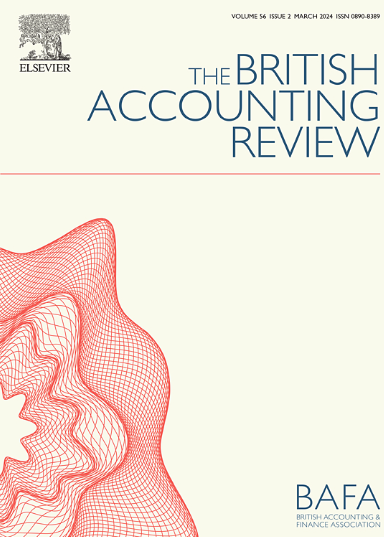Is greater connectivity of financial and non-financial information in annual reports valued by market participants?
IF 9.4
3区 管理学
Q1 BUSINESS, FINANCE
引用次数: 0
Abstract
The establishment of the International Sustainability Standards Board (ISSB), and the endorsement by the International Financial Reporting Standards (IFRS) foundation of the principles underlying the Integrated Reporting (IR) Framework, attest to a regulatory intent to develop a disclosure framework better connecting sustainability-related financial disclosures with financial disclosures. Strategic Reporting (SR), effective in the United Kingdom (U.K.) since 2013, is a prime example of such a framework. Utilizing proprietary data from PwC U.K., we find higher SR disclosure quality is associated with higher liquidity, lower cost of capital, and more accurate, less dispersed analysts’ forecasts. We then hypothesize and compare these impacts with the capital market effects of disclosure quality under the reporting framework preceding SR. We find that the effects of higher liquidity and lower cost of capital are more pronounced under SR, suggesting that SR, as a mandated, more connected reporting framework, enables more effective capital market communication. We also find that the incremental capital market benefits are more significant for entities with higher exposure to the change, better sustainability performance and higher organizational complexity. For regulators and standard setters, these findings indicate that their emphasis on greater connectivity of financial and non-financial information is valued by market participants.
市场参与者是否重视年度报告中财务和非财务信息的更大关联性?
国际可持续发展标准委员会(ISSB)的成立,以及《国际财务报告准则》(IFRS)基金会对综合报告(IR)框架基本原则的认可,证明了监管机构有意制定一个披露框架,更好地将与可持续发展相关的财务披露与财务披露联系起来。自 2013 年起在英国(U.K.)生效的战略报告(Strategic Reporting,SR)就是这样一个框架的典型例子。利用普华永道英国公司的专有数据,我们发现较高的战略报告披露质量与较高的流动性、较低的资本成本以及更准确、更分散的分析师预测相关联。然后,我们将这些影响与 SR 之前的报告框架下信息披露质量对资本市场的影响进行了假设和比较。我们发现,提高流动性和降低资本成本的效果在证券交易准则下更为明显,这表明证券交易准则作为一个强制性的、关联性更强的报告框架,能够实现更有效的资本市场沟通。我们还发现,资本市场的增量效益对那些受变革影响较大、可持续发展表现较好和组织复杂性较高的实体更为显著。对于监管者和标准制定者来说,这些研究结果表明,市场参与者重视加强财务和非财务信息的联系。
本文章由计算机程序翻译,如有差异,请以英文原文为准。
求助全文
约1分钟内获得全文
求助全文
来源期刊

British Accounting Review
BUSINESS, FINANCE-
CiteScore
8.60
自引率
3.90%
发文量
39
审稿时长
76 days
期刊介绍:
The British Accounting Review*is pleased to publish original scholarly papers across the whole spectrum of accounting and finance. The journal is eclectic and pluralistic and contributions are welcomed across a wide range of research methodologies (e.g. analytical, archival, experimental, survey and qualitative case methods) and topics (e.g. financial accounting, management accounting, finance and financial management, auditing, public sector accounting, social and environmental accounting; accounting education and accounting history), evidence from UK and non-UK sources are equally acceptable.
 求助内容:
求助内容: 应助结果提醒方式:
应助结果提醒方式:


